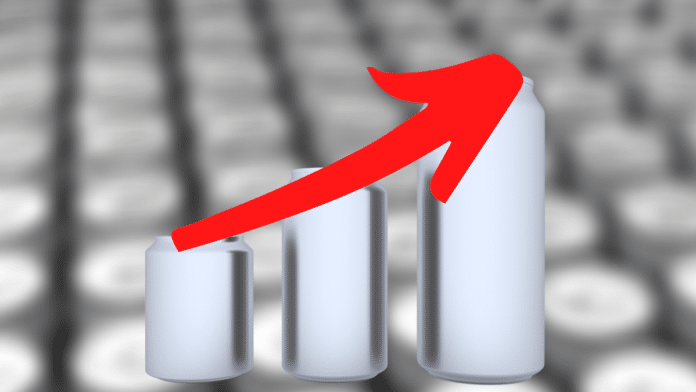In spite of increased production and sourcing, aluminum prices continue to rise. Hard Seltzer News first reported on the can shortage in August of last year, and the problem has continued into 2021. The high demand, coupled by import tariffs, amount to a forecast of continued rise in prices.
The food and beverage industries have been hit hard by the pandemic, which is partly to blame for why the aluminum supply is so stressed. Thanks to bar and restaurant closures, we experienced a collective shift in how, when, and where we drink, and consumption quickly moved off-site.
Demand for kegs plummeted, sales of shelf-stable while canned drinks spiked in sales. Many liquor brands hurried to release their own ready-to-drink (RTD) canned cocktails to help consumers recreate their favorite bar and restaurant cocktails from the safety of home.
Can manufacturers like Ball are feeling the heat, with no relief in sight. On the company’s last earnings call, president Daniel Fisher said that he expects “demand continuing to outstrip supply well into 2023.”
Ball Working Overtime
On the same earnings call, CEO John Hayes stressed that Ball is working at full capacity.
“We are capacity constrained, right now,” Hayes said as a warning to beverage companies considering using cans. “That’s one of the reasons why we’ve been accelerating our investments, to kind of free up some capacity to really kind of push those things. Because right now, the reality is we don’t have the cans to supply those people that are looking to go into it.”
Midwest Premium Affected by Tariff
Monster Beverage, which has been flirting with the idea of releasing its own hard seltzer for months, also lamented rising aluminum prices. Vice chairman and co-CEO Hilton Schlosberg predicts that prices will continue to rise in 2021.
“Obviously, we monitor aluminum costs every morning. And we’ve seen, as you’ve seen and the rest of the group have seen an increasing situation with regard to aluminum and also with the Midwest premium, which I think has taken a lot of us by surprise,” said Schlosberg.
“Midwest Premium was in the upper-single digits some months ago and with the imposition of the tariffs on aluminum went up. And everyone expected that to fall. And it hasn’t. It’s just sitting at just below $0.16.”
Larger players like Molson Coors are able to lean on additional sourcing. As a result, they don’t feel the strain as much. The beverage company expects to return to “normal material availability” by the end of Q1, CEO Gavin Hattersly reported on a recent earnings call.
“After the uptick of the coronavirus pandemic, we aggressively began sourcing additional aluminum cans from all over the world to support our core brands to address unprecedented off-premise demand,” said Molson Coors CFO Tracey Joubert
Tariffs Continued Under Biden
So far the Biden Administration has continued the tariffs on aluminum imported from the United Arab Emirates, which were started by Trump. In the proclamation announcing the position, President Biden referred to the “economic viability of the domestic aluminum industry” as a national security issue.
As a result, even the price of recycled aluminum is on the rise. It is now at 53.31 cents per pound, a 7% increase over this time last year, just before the onset of Covid-19.
Expect to see more beverage companies impacted by the rising price of this commodity, as well as an uptick in aluminum alternatives
like glass, cardboard, and even paper bottles.
- Molson Coors Increases NA Foothold with La Colombe Coffee - September 15, 2021
- Half Time Beverage Adds Seltzer and Canned Cocktails Gift Packs - September 14, 2021
- Coming Soon: Great Lakes Agave Twist Ranch Water - September 13, 2021














